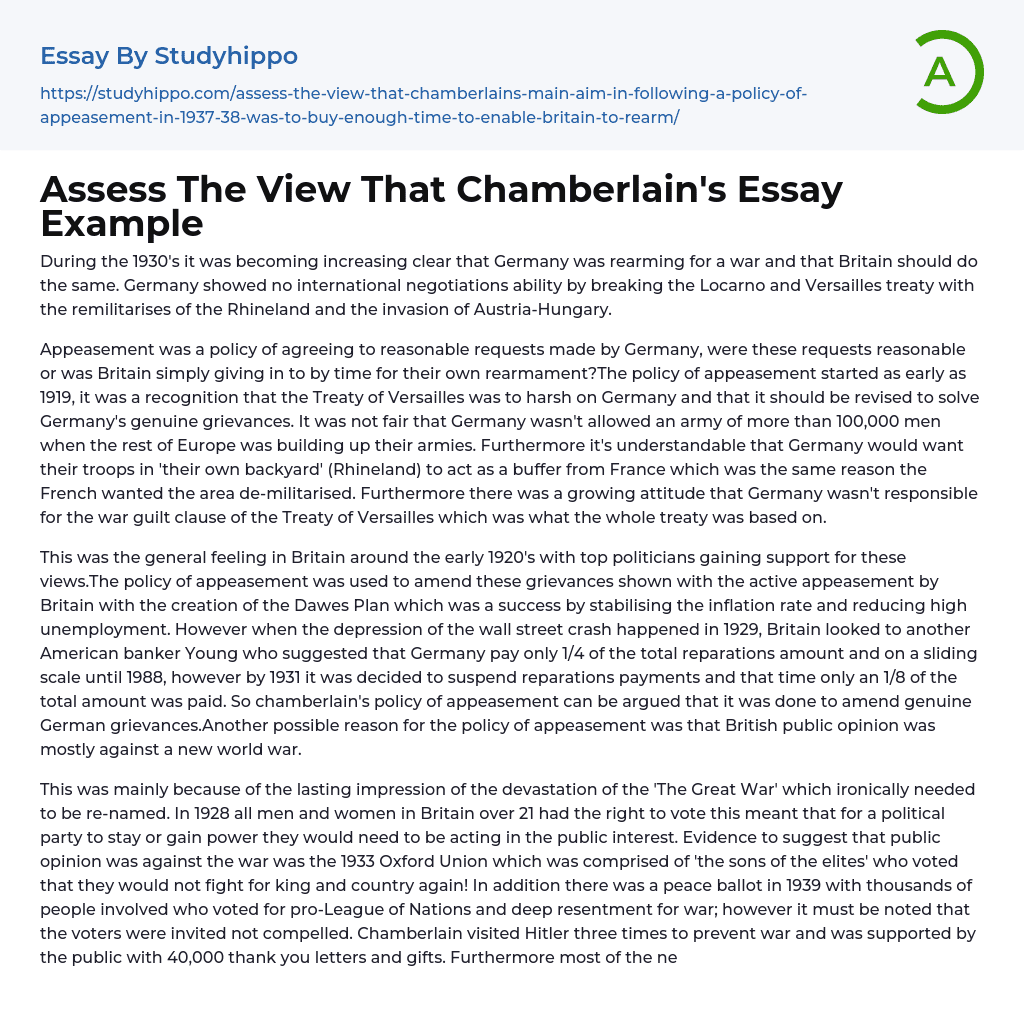During the 1930s, it became apparent that Germany was readying for war and Britain needed to do likewise. Through its remilitarization of the Rhineland and invasion of Austria-Hungary, Germany showed poor negotiation abilities on the global platform by breaking both the Locarno and Versailles treaties.
The policy of appeasement, which entailed accepting reasonable requests from Germany, sparked debate over whether Britain was surrendering or simply stalling for time to arm themselves. Its roots can be traced back to 1919 and reflect an acknowledgement that the Treaty of Versailles had imposed excessively severe terms on Germany. Many believed that the treaty should be revised in order to address Germany's fair grievances. One such issue was Germany being prohibited from having a military larger than 100,000 troops while other European nations were expanding their armies. Furthermore, Germany wi
...shed to occupy its own Rhineland as a defense against France—a goal shared by France in pursuing its own militarization. Lastly, there was an increasing belief that Germany could not be held responsible for the war guilt clause of the Treaty of Versailles—the very foundation upon which the treaty rested.
During the early 1920s in Britain, influential politicians gained support for views that called for appeasement as a solution to their grievances. An example of this was Britain's active implementation of the Dawes Plan, which successfully stabilized inflation rates and reduced high unemployment. However, following the Wall Street Crash in 1929 and the subsequent depression, Britain turned to American banker Young who proposed Germany pay only one-fourth of their total reparations amount on a sliding scale until 1988. By 1931, it was decided to suspend all reparations payments with only one-eighth
having been paid. As a result, Chamberlain's policy of appeasement can be seen as an effort to address legitimate German grievances while also considering British public opinion against another world war.
The aftermath of 'The Great War' had a lasting impact on Britain, leading to the prevalent adoption of a policy of appeasement. Political parties were under pressure to align their actions with the public's interests after granting all men and women over 21 years old the right to vote in 1928. Evidence of public opposition against war was shown during the 1933 Oxford Union where the 'elites' voted against fighting for king and country, as well as through thousands of votes garnered by a peace ballot conducted in 1939 which showed support for pro-League of Nations and resentment towards war. However, voting was not mandatory but merely an invitation. British Prime Minister Chamberlain made three visits to Hitler in an effort to prevent war, gaining much support from the public as proven by over 40,000 letters and gifts sent his way; most newspapers also backed him up due to Britain's fear towards air power that could allow "the bomber to always get through." This fear may have been one potential reason behind their adoption of appeasement since it aimed at obtaining public approval.
Chamberlain, a pacifist, believed that the policy of appeasement was aimed at avoiding the 'Evils of War'. The First World War had a devastating impact, resulting in 750,000 British troop deaths and 250,000 empire deaths. Additionally, thousands more casualties later died due to war wounds. Multiple developed countries such as Britain, Germany, France, Poland and Austria-Hungary faced collapse because of this war. It
caused Britain to lose its title as the world's greatest power by severely damaging the economy and allowing Communism to take hold in Russia. Furthermore, public opinion played an important role since families who lost their fathers or saw them survive during The First World War were now facing conscription if another war broke out.
Chamberlain advocated avoiding war at all costs due to the numerous negative consequences it brings. He implemented an appeasement strategy, which some argue contributed to the outbreak of war as Britain failed to resist Hitler's demands. Chamberlain's primary objective with his 1937-38 appeasement policy was to provide sufficient time for Britain to rearm. Unfortunately, in 1938, Britain lacked adequate military preparedness owing to the long-lasting impact of a recession and limited financial resources for rearmament. It wasn't until significant rearmament efforts took place that unemployment decreased, jobs were created and Britain fully recovered from the depression.
The policy of appeasement aimed to give Britain time and was justified by the development of pioneering radar technology. Although still in its infancy in 1938, it covered the entire southern coast and London by the time Britain declared war a year later. This proved crucial to Britain's defence and contributed greatly to Germany's ultimate defeat. Despite arguments that appeasement was primarily intended to allow for rearming, this is not the most important reason for its adoption. Instead, factors such as a desire to avoid war, public opposition to conflict, and Germany's genuine grievances all played key roles in the decision-making process.
Despite Chamberlain's pacifist beliefs, he declared his willingness to exert all available power in order to avoid war - a statement that greatly influenced
the adoption of appeasement as a policy. However, the primary motivation behind this strategy was the British public's aversion to war and its detrimental outcomes, including the conscription of their children for distant battles - especially those who had already served in the armed forces.




